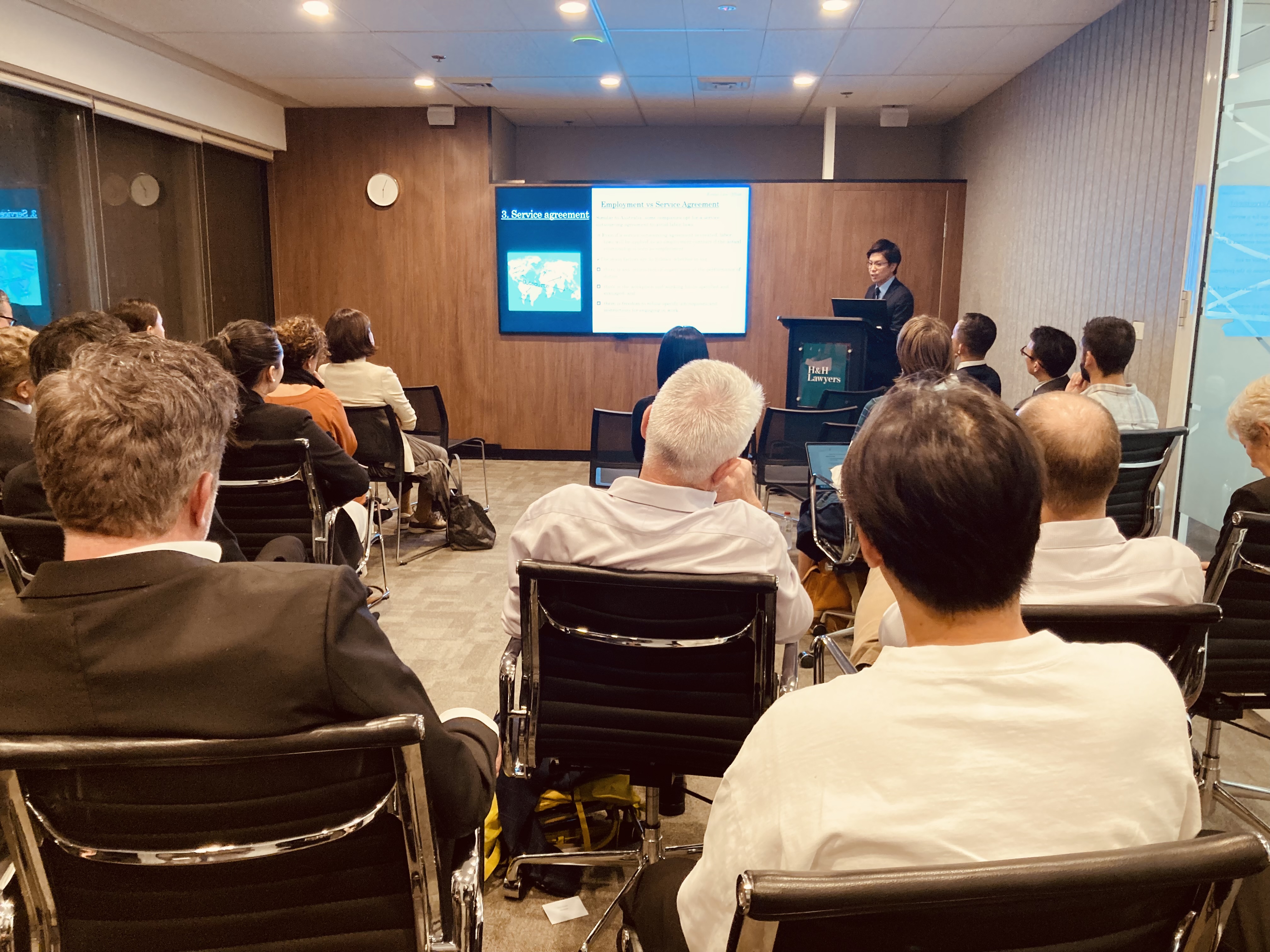オーストラリア訪問記(9)
毎年恒例のオーストラリア1週間の出張の旅に行ってまいりました。
今、帰国の途のフライトの中で、このコラムを書いています。当然、JET STREAMを聴きながら・・。
まずはクライアントの皆様にはご不便をおかけしましたこと、深くお詫び申し上げます。
今回の出張のメインイベントは、現地の弁護士の先生方と共同で行った、“Australia-Japan Cross-Border Employment – Legal Issues in a Mobilised Workforce”と題するセミナーです。
コロナの影響もあって、今では一つのスタンダードな働き方のスタイルとなった、リモートワーク、その中でも特にクロスボーダーのリモートワークを取り巻く法律問題(労働法分野)を、日・豪それぞれの法律の視点で解説しました。
今回は、Australia-Japan Society of NSWというオーストラリア・ニューサウスウェールズ州(主にはシドニー)の日豪をつなぐ団体主催のセミナーでした。
こちらの団体のメンバー構成が、概ねオーストラリア人7割:日本人3割とのことで、今回のセミナー参加者も、概ね同じような割合でオーストラリア人・日本人それぞれの方々にご参加いただきました。
特に今回の傾向としては、現地の弁護士(ソリシター)の方にも多くご参加いただき、今回の問題が実務家の中でも関心のあるテーマであったことがうかがい知れました。

 今回のコラムでは、折角ですので、そのセミナーで扱った内容(日本法の視点での内容)のアウトラインを、以下、簡単にご紹介できればと思います。
今回のコラムでは、折角ですので、そのセミナーで扱った内容(日本法の視点での内容)のアウトラインを、以下、簡単にご紹介できればと思います。
1.今回のセミナーのアウトライン
(1)前提
■Case: Individuals residing in Australia work remotely for Japanese companies.
前提としたケース:オーストラリア在住で、日本の会社に雇用されたリモートワーカー。
⇒From the perspective of Japanese law, I will briefly outline the potential legal issues that may arise in Japan when Japanese companies employ workers residing in Australia to work remotely.
日本法の視点で、そのようなオーストラリアにいながらリモートで日本の会社に労務を提供する場面における、潜在的な法律問題のアウトラインを説明します。
(2)Applicable Law -適用法の問題-
■Act on General Rules for Application of Laws (Act No. 10 of 1898)
☑ First Step:
Whether or not parties agreed on the governing law at the time of entering into the employment contract (Article 7).
⇒If parties agree on the governing law, it applies to the employment contract.
NOTE: There is an exception.
⇒If the governing law is not the law that is most closely connected to the employment contract (“最密接関係地法”), employees may assert the application of specific mandatory provisions within the law of the closest connection.
■What is the law that is most closely connected to the employment contract (“最密接関係地法”)?
⇒The law of the place where the work should be provided under the employment contract (“労務提供地法”) is presumed to be the labor law that is most closely connected to the employment contract.
■What are specific mandatory provisions?
⇒Ex.
・Minimum Wage (Minimum Wage Act)
・Restrictions on the Dismissal of Workers (Labor Standards Act Article 19, Labor Contracts Act Article 16)
☑ Second Step:
If parties do not agree on the governing law, the law of the place where the work should be provided under the employment contract (“労務提供地法”) applies to the employment contract.
▼Conclusion
■Agree on the governing law:
⇒The agreed law + Specific mandatory provisions in “労務提供地法”.
■Not agree on the governing law:
⇒“労務提供地法”
適用法の問題は、日本の法律(通則法)の視点では、日本の会社と豪州在住の労働者との間で、準拠法の合意がなされたか否か、により区別して考えることが通常です。
合意があった場合は、推定規定であるため、場合によってはこれと異なる結論はあり得るものの、合意された準拠法+労務提供地法(本件であればオーストラリアのFair Work Act等)の強行規定、となります。
合意がない場合は、労務提供地が適用法と推定されます。
(3)Jurisdiction – 裁判管轄の問題 –
If a dispute arises between a Japanese company and a worker residing in Australia, which country’s jurisdiction will apply?
⇒ In other words, when can a Japanese court accept labor cases in accordance with Japanese law?
⇒ Act on Code of Civil Procedure(Act No. 109 of 1996)
☑ First Step:
Whether or not parties agreed on (Article 3-7.1).
⇒If a company and an employee agree that the Japanese court has jurisdiction, the following conditions must be satisfied:
◆Requirement 1: Written agreement or emailed agreement (Article 3-7.2 and 3)
◆Requirement 2: (Article 3-7.6)
* the agreement was made at the time an employment contract ends, and the Japanese court where the work was being provided as of that; or
* the agreement was made before an employment contract ends, and the worker files an action with the Japanese court based on the agreement or the company files an action with the Japanese court and the worker responds to the company’s action (invokes said agreement).
Furthermore…
If the agreement on jurisdiction fulfills above requirements, it does not mean exclusive jurisdiction.
For example:
The agreed jurisdiction is Japan, but an employee provided work both in Australia and Japan (ex. regularly goes back and forth between Japan and Australia to work).
⇒ Both countries are likely to be seen as places of labor provision.
⇒ In this case, there is a possibility that if the employee files a lawsuit in Australian court, the company cannot claim to refuse it due to out-of-jurisdiction because the agreement on jurisdiction is not exclusive.
☑ Second Step:
If there is no agreement on jurisdiction, the following courts of place mainly have jurisdiction over employment contracts:
- Place(s) of labor provision.
- Place of defendant’s domicile (if a defendant is a company, it means principal office or business office).
裁判管轄の問題は、日本の法律(民事訴訟法)の視点では、日本の会社と豪州在住の労働者との間で、裁判管轄の合意がなされたか否か、により区別して考えることが通常です。
この点、適用法の問題と同様の思考方法をたどることになりますが、裁判管轄の合意が法的に有効と認められるケースは、準拠法の合意の場面と比べ、厳しい要件が課されています。
例えば、その合意は書面又は電磁的方法によりなされなければならない、とされたり、労働契約終了時に合意があり、かつその裁判管轄の場所は、その時点での労務提供地である必要がある、とされています。
労働契約締結時における裁判管轄の合意も、例外的に有効となる場合はありますが、裁判等において、労働者がその裁判管轄の合意を援用すること等が必要となります。
このように労働契約のもとでは、裁判管轄の合意は、かなり厳格な要件を求められており、クロスボーダーのリモートワーカーを採用する日系企業様においては、注意を要します。そして、このような使用者側にとって裁判管轄合意に関する厳格な要件を設ける日本法(民事訴訟法)の考え方を踏まえると、日系企業様は、リモートワーカーとの間で、万一紛争となった場合には、そのリモートワーカーの居住地(労務提供地)で裁判を行わざるを得ない可能性が高いことを認識しておく必要がある、といえます。
2.その他の余談(Cho Cho San、Martin Place)
今回も、毎度ながら、観光地にはどこにも行けず、オペラハウスすら電車に乗りながらチラ見できた程度に終わってしまいましたが、しっかりCho Cho San(レストラン)には視察に行ってまいりました(Cho Cho Sanの詳細は、こちらをご参照)。
相変わらず、乱れた日本食レストランでしたが、きっと次回シドニー訪問時にも行ってしまうんやろうなぁ・・・。

我らがMartin Placeの駅ビルも、相変わらず工事中でしたが、今年中には完成するとのこと・・。

最後に、今回、ご多忙のところ面談や食事にお付き合い頂いたシドニー現地の皆様、誠に有難うございました。
【本内容は、執筆当時の情報をもとに作成しております。また、本コラムは、個別具体的な事案に対する法的アドバイスではなく、あくまで一般的な情報であり、そのため、読者の皆様が当該情報を利用されたことで何らかの損害が発生したとしても、かかる損害について一切の責任を負うことができません。個別具体的な法的アドバイスを必要とする場合は、必ず専門家(オーストラリア現地法に関する事項は、オーストラリア現地の専門家(弁護士等))に直接ご相談下さい。】
【弁護士 高橋 健/ Lawyer Ken Takahashi】



